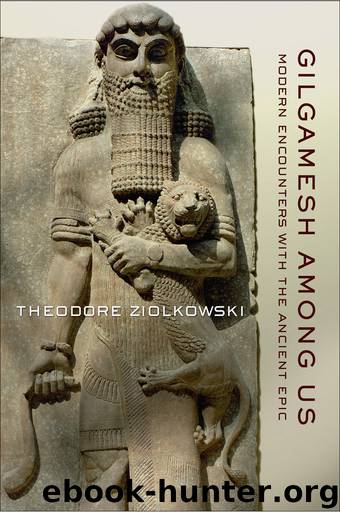Gilgamesh Among Us by Ziolkowski Theodore.;

Author:Ziolkowski, Theodore.;
Language: eng
Format: epub
ISBN: 978-0-8014-6342-6
Publisher: Lightning Source Inc. (Tier 3)
Gilgamesh Psychoanalyzed
Despite the early interest of Freud and Jung, which we noted in chapter 1, and the conspicuous exception of Joseph Campbell, the Gilgamesh epic was essentially neglected in psychoanalytic studies until the 1980s. In The Hero with a Thousand Faces (1948) Campbell offered a Freudian-Jungian psychoanalytic approach to myth. He devotes only three pages to Gilgamesh as “the greatest tale of the elixir quest” in the prebiblical tradition.10 Limiting himself to that archetype and, typically for that period, neglecting the themes of friendship and eros, he skips the first half altogether and never mentions Enkidu. Treating the epic simply as Gilgamesh’s quest to attain “the watercress of immortality,” he discusses only the scenes with Siduri and Utnapishtim, which he briefly recapitulates without commentary. Gilgamesh is thus reduced to simply one among various examples to illustrate what the chapter heading calls “The Ultimate Boon.” But Campbell’s widely read work was enormously influential in persuading the modern psychiatrically inclined public that “it has always been the prime function of mythology and rite to supply the symbols that carry the human spirit forward, in counteraction to those other constant human fantasies that tend to tie it back” (11). It was the purpose of his book, he proclaimed, “to uncover some of the truths disguised for us under the figures of religion and mythology by bringing together a multitude of not-too-difficult examples and letting the ancient meaning become apparent of itself” (vii). It is in no small measure thanks to Campbell that the Gilgamesh story became such a visible example of the modern quest for identity, as was evident in the poetry and publicizations of Olson and Corso.
During the 1980s two studies were written that can serve paradigmatically as contrasting paradigms of Freudian and Jungian interpretation. In a lengthy essay in American Imago entitled “The Epic of Gilgamesh,” Tracy Luke and Paul Pruyser explicitly disclaimed Jung’s attempt “to absolutize [our psychic inheritance] by fixating its themes and images into archetypes residing as templates in a collective unconscious.”11 Instead, they treat the narrative as “a liturgical drama,” using Erik Erikson’s developmental stages of human growth as their model. They deny that Gilgamesh is a true mythic hero because he is not the product of a miraculous birth and does not solve any great cosmic problems. Rather, they argue, he is a legendary person who slowly acquires some wisdom and grows “from brutish selfishness and lust to acceptance of his mortality.” To prove their point, however, the authors impose their own expectations on the text, even to the extent, occasionally, of distorting it: “If we have appraised his situation accurately, we will be alert to clues about rivalry, incest, and castration threats.” Since the mother motif is central to their argument, it is important for the authors to find mother-figures everywhere. The harlot is said to be “an equivalent of Aruru, the divine mother of Enkidu who, by another name Ninsun, is soon introduced as the mother of Gilgamesh,” and her mating with him is
Download
This site does not store any files on its server. We only index and link to content provided by other sites. Please contact the content providers to delete copyright contents if any and email us, we'll remove relevant links or contents immediately.
| Ancient & Classical | Arthurian Romance |
| Beat Generation | Feminist |
| Gothic & Romantic | LGBT |
| Medieval | Modern |
| Modernism | Postmodernism |
| Renaissance | Shakespeare |
| Surrealism | Victorian |
4 3 2 1: A Novel by Paul Auster(11772)
The handmaid's tale by Margaret Atwood(7436)
Giovanni's Room by James Baldwin(6793)
Asking the Right Questions: A Guide to Critical Thinking by M. Neil Browne & Stuart M. Keeley(5344)
Big Magic: Creative Living Beyond Fear by Elizabeth Gilbert(5337)
Ego Is the Enemy by Ryan Holiday(4935)
On Writing A Memoir of the Craft by Stephen King(4654)
The Body: A Guide for Occupants by Bill Bryson(4569)
Ken Follett - World without end by Ken Follett(4435)
Bluets by Maggie Nelson(4251)
Adulting by Kelly Williams Brown(4224)
Eat That Frog! by Brian Tracy(4143)
Guilty Pleasures by Laurell K Hamilton(4109)
White Noise - A Novel by Don DeLillo(3824)
The Poetry of Pablo Neruda by Pablo Neruda(3809)
Fingerprints of the Gods by Graham Hancock(3729)
Alive: The Story of the Andes Survivors by Piers Paul Read(3719)
The Book of Joy by Dalai Lama(3681)
The Bookshop by Penelope Fitzgerald(3613)
